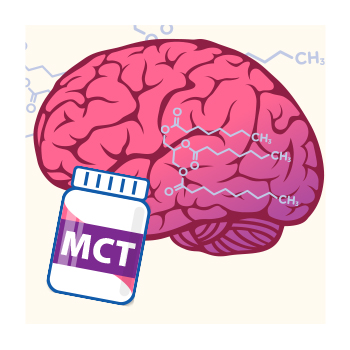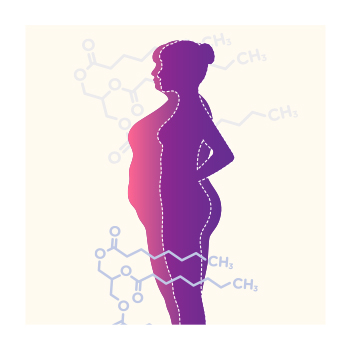


Sign-up for {N}power to get exclusive discounts, newsletters, members-only features, and more!

The words medium-chain triglyceride (MCT) may not conjure images of vibrant health, mental fortitude, optimal energy levels, and a healthy weight. You might even be inclined to shy away because the word ‘triglyceride’ has been taught as something to fear. But it’s time to demystify MCT once and for all so we can collectively reap the health benefits. Whether you’re looking for a brain boost, a new tool to help with weight loss and metabolic health, or searching for a pure source of energy to help you on the pickleball courts, MCT is for everybody!
 Our brains require more energy than any other organ, and most of that energy comes from glucose. But when glucose levels are low (have you ever experienced brain fog when you haven’t had anything to eat for a while?), or when there is impaired glucose metabolism in the brain, as in the case with Alzheimer’s disease,1 MCT can provide an easy-to-use source of energy to brain cells. MCT is unique because of the way it is absorbed and used by the body—when ingested, it is efficiently converted into ketones, an alternative fuel source the body and brain can use instead of glucose, and unlike glucose, which creates reactive oxygen species (i.e., oxidative stress) when burned for energy, ketones do not, making them a “cleaner” source of energy. Those ketones can cross the blood-brain barrier to rapidly supply your brain with fuel as an immediate and clean energy source, supporting and enhancing cognitive function. MCT taken in supplement form is rapidly converted to ketones in the liver soon after ingestion and encourages your body to switch to a metabolic state in which it burns fat for energy and the brain is able to utilize ketones, in addition to glucose, for energy.2 3 4 5
Our brains require more energy than any other organ, and most of that energy comes from glucose. But when glucose levels are low (have you ever experienced brain fog when you haven’t had anything to eat for a while?), or when there is impaired glucose metabolism in the brain, as in the case with Alzheimer’s disease,1 MCT can provide an easy-to-use source of energy to brain cells. MCT is unique because of the way it is absorbed and used by the body—when ingested, it is efficiently converted into ketones, an alternative fuel source the body and brain can use instead of glucose, and unlike glucose, which creates reactive oxygen species (i.e., oxidative stress) when burned for energy, ketones do not, making them a “cleaner” source of energy. Those ketones can cross the blood-brain barrier to rapidly supply your brain with fuel as an immediate and clean energy source, supporting and enhancing cognitive function. MCT taken in supplement form is rapidly converted to ketones in the liver soon after ingestion and encourages your body to switch to a metabolic state in which it burns fat for energy and the brain is able to utilize ketones, in addition to glucose, for energy.2 3 4 5
The wonderful thing about MCT is that it can benefit all brains, from healthy adults looking to power up their brain function and clear out the brain fog, to those with diagnosed cognition issues, such as dementia or Alzheimer’s disease.
In one study researchers examined whether MCT could improve cognition in a group with mild cognitive impairment (MCI), by providing the brain with more energy. The results were significant. Those taking MCT saw their brain ketone metabolism increase by 230 percent (in other words, the brain was able to efficiently use ketones for energy when glucose was lacking) and measures of episodic memory, language, executive function, and processing speed improved on MCT versus the participants’ baselines “…in direct relation to the increase in plasma ketones…”6
A 2022 randomized, double‐blind, placebo‐controlled, crossover study of elderly subjects with diagnosed mild to moderate Alzheimer's disease, found that the subjects who took two to three tablespoons/day of C8 MCT, a form of MCT that is very easily absorbed and used as fuel, showed improvements in cognitive assessment scores. In fact, 80 percent remained stable or improved. The researchers concluded, “There was marked stability of cognitive function over the 15 months of the trial,” and added there was “no effect on body weight, composition, or serum lipids…,” and though some experienced GI side effects at higher doses (diarrhea, abdominal cramping), symptoms resolved with a dose decrease.7
Finally, in both type-1 diabetics and healthy people, when glucose availability is reduced (hypoglycemia), MCT can preserve cognitive function. Even in healthy people with normal glucose metabolism, increasing ketones in the body “…cause massive changes in cerebral fuel metabolism.” In other words, when there are sufficient ketones, the brain will preferentially burn those for energy versus glucose.8 9
 Finding new “weighs” to lose weight might be our favorite pastime. Just turn on the TV, scroll through an article on your phone, or talk to your trusted healthcare practitioner and you’ll surely learn about the latest, greatest weight-loss trend. Quietly, however, there has been study after study of MCT’s effect on weight loss, body composition, and metabolism over the years—with striking results.
Finding new “weighs” to lose weight might be our favorite pastime. Just turn on the TV, scroll through an article on your phone, or talk to your trusted healthcare practitioner and you’ll surely learn about the latest, greatest weight-loss trend. Quietly, however, there has been study after study of MCT’s effect on weight loss, body composition, and metabolism over the years—with striking results.
One meta-analysis and review looked at the results from 13 randomized clinical trials comparing the effects of MCT with long-chain triglycerides (LCT) like those found in soybean and corn oil, on specific biomarkers in healthy men and women. It was found that MCT resulted in a significant reduction in body weight, waist circumference, hip circumference, total body fat, total subcutaneous fat, and visceral fat compared to LCT.10 Notably, the studies varied in duration, dose, and control of caloric intake, but the results were all favorable in the end.11
Additionally, when MCT oil is consumed after a fasting period, such as taking it with breakfast after fasting overnight, it causes an increase in leptin, a hormone released from fat cells that sends signals to the brain to tell your body it does not require more energy (inhibiting hunger), as well as peptide YY (PYY) levels. PYY is another hormone created in the small intestines that decreases appetite and causes you to feel full when it binds to brain receptors. Increased levels of these two hormones are associated with appetite suppression and increased satiety.12
When it comes to metabolic health, animal models have found that MCT induces breakdown of fat in the liver, improves insulin sensitivity, and stimulates brown fat thermogenesis—brown fat is rich in mitochondria that burn energy, which helps burn more calories; it also helps regulate glucose and fat metabolism. A recent human pilot study found that MCT improved insulin sensitivity in a subset of subjects, including men, African Americans, and subjects with a lower BMI, leading the researchers to conclude that it “warrants further study.”13 14 15
 Since we’ve learned that consumption of MCT supports the body’s production of ketones—an alternative energy source for the body—and those ketones are absorbed directly into the bloodstream and brain, it’s no surprise that MCT is excellent for instant and sustained energy. In one study, recreational athletes who ate foods containing 6 g of MCT daily for two weeks could do longer sessions of high-intensity workouts than people who ate foods containing LCT. The researchers concluded, “Our data suggest that short-term ingestion of food containing a small amount of MCT suppresses the increase in blood lactate concentration [a marker of muscle fatigue] and rating of perceived exertion during moderate-intensity exercise and extends the duration of subsequent high-intensity exercise, at levels higher than those achieved by ingestion of LCT-containing food.”16
Since we’ve learned that consumption of MCT supports the body’s production of ketones—an alternative energy source for the body—and those ketones are absorbed directly into the bloodstream and brain, it’s no surprise that MCT is excellent for instant and sustained energy. In one study, recreational athletes who ate foods containing 6 g of MCT daily for two weeks could do longer sessions of high-intensity workouts than people who ate foods containing LCT. The researchers concluded, “Our data suggest that short-term ingestion of food containing a small amount of MCT suppresses the increase in blood lactate concentration [a marker of muscle fatigue] and rating of perceived exertion during moderate-intensity exercise and extends the duration of subsequent high-intensity exercise, at levels higher than those achieved by ingestion of LCT-containing food.”16
Besides the everyday athlete, MCT benefits those on the other end of the spectrum—the frail and the elderly. A 2019 study examined whether treatment with MCT alone is sufficient to increase muscle strength and function and activities of daily living (ADL) in such individuals. Sixty-four nursing home residents were enrolled in the three-month trial. Those in the MCT group had a significant 48 percent increase in muscle strength and a 7.5 percent increase in scores assessing ADL. They concluded that “6 g of MCT could increase the muscle strength and function of frail elderly individuals and also improve their ADL.”17
Whether you’re looking for a brain changer to stay sharp, an ally to stay metabolically healthy and maintain a healthy weight, or a functional food to stay physically spry, strong, and energized so you can dominate the pickleball court long into your twilight years—MCT is there for all of it.
Boost Your Germ-Fighting Power with MCT!
 With the winter months on the horizon, now is the perfect time to add MCT to your immune-supportive routine. Studies show that MCT has natural antimicrobial properties and may help balance bacteria in the gut. Bacteria known to be killed by MCT include streptococcus (which causes strep throat, pneumonia, and sinus infections), staphylococcus (which causes food poisoning and urinary tract infections), Neisseria (which causes meningitis, gonorrhea, and pelvic inflammatory diseases), and other strains that cause stomach viruses, candida, ulcers, and sexually transmitted diseases.19 What’s more, research has found that MCT added to milk and infant formula inactivated a number of pathogens, including respiratory syncytial virus (RSV), Haemophilus influenzae (a bacterium that can lead to meningitis and pneumonia), and Group B Streptococcus.20 Just a few more reasons to reach for the power of MCT!
With the winter months on the horizon, now is the perfect time to add MCT to your immune-supportive routine. Studies show that MCT has natural antimicrobial properties and may help balance bacteria in the gut. Bacteria known to be killed by MCT include streptococcus (which causes strep throat, pneumonia, and sinus infections), staphylococcus (which causes food poisoning and urinary tract infections), Neisseria (which causes meningitis, gonorrhea, and pelvic inflammatory diseases), and other strains that cause stomach viruses, candida, ulcers, and sexually transmitted diseases.19 What’s more, research has found that MCT added to milk and infant formula inactivated a number of pathogens, including respiratory syncytial virus (RSV), Haemophilus influenzae (a bacterium that can lead to meningitis and pneumonia), and Group B Streptococcus.20 Just a few more reasons to reach for the power of MCT!
MCT oils and powders have a very mild taste and can easily be added to the diet in many ways. One popular way is to add MCT to your morning coffee (or chai, cocoa, latte, etc.). Outside of coffee, MCT can be added to smoothies, nut butters, chia pudding, and the oil can be used to make salad dressing or as a finishing oil for cooked foods. Human studies have used anywhere from 6 to 42 grams of MCT per day safely18. Start with a small serving (such as ¼ or ½ a serving of your chosen product) to allow your body time to adjust as you slowly work your way up to your full desired dose. This minimizes the risk of the most common side effects of diarrhea, dizziness, and headaches.



Sign-up for {N}power to get exclusive discounts, newsletters, members-only features, and more!